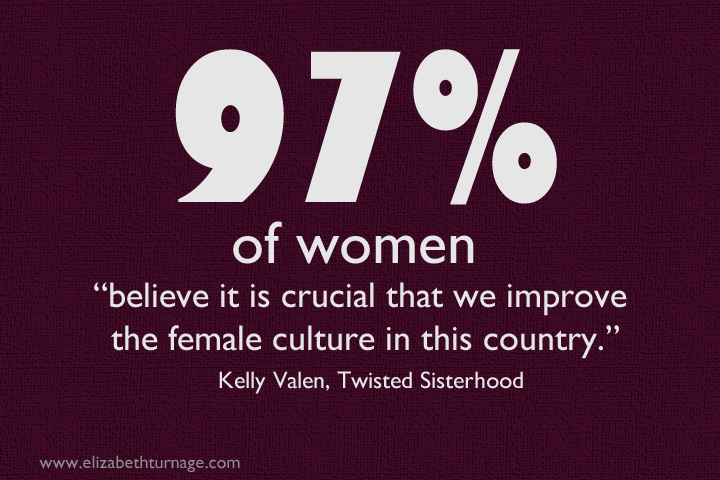Kelly Valen, in her compelling 2010 study of female relationships,Twisted Sisterhood discovered through poll that 97 percent of women “believe it is crucial that we improve the female culture in this country.”
In the last post, I told a story of being attacked by a fellow Christian and how a sister-friend loved me well in the aftermath. Why do women treat other women so harshly, and what can be done to improve female culture? When we think about what happened to women in the fall, broken sisterhood might make more sense. Since Adam and Eve sinned, all women have these things in common:
- know we are naked.
- feel shame.
- want to hide.
- make pitiful attempts to cover ourselves.
- blame others for our sin and sorrow, including God.
- feel pain in childbirth — I’ve always wondered — does this include the pain of monthly cycles?
- desire to dominate men.
- or, as some people interpret it, desire men so much we’ll do anything to get and keep them.
- demand control over our worlds.
How do these sins play out in women’s relationships with other women?
Mean Girls, a 2004 comedy, satirized the cliques and bullying that are commonplace occurrences in high schools. Any woman who has suffered being shunned on a playground as a child or being cyberbullied as a teen knows that the dark terror and shame of female bullying holds no humor.
The culture of female aggression does not end when we grow up, though — new studies find women sabotaging other women in every arena of life:
- In the workplace, women will deliberately make a co-worker look incompetent.
- In the area of motherhood, the phrase “Mommy wars” has been coined to describe the friction between moms who stay-at-home full-time and those who work full-time.
- In the competition for scarce resources of “good” available men, women demean and manipulate other women.
Sadly, the fallen reality of women’s relationships is not limited to the broader culture but plays out regularly among Christians as well. The Bible recounts the earliest true and tragic stories of female aggression:
- Sarah, the mother of all nations, abuses her slave Hagar — and Hagar is no saint either.
- The terrible story of Rachel and Leah is the first account of “sister-wives” and leaves no illusions about dark conflict between women vying for a man who isn’t the catch he might have seemed to be.
- Martha complains to no less than the Savior himself about her sister’s laziness.
- The apostle Paul calls out two devoted ministers of the gospel, Euodia and Synteche, regarding their ministry quarrels.
If competition, condemnation, and irritation exist in women’s relationships in the Bible, it should come as no surprise that these and other sins continue to affect Christian women’s community:
- Some women labor to look good physically and spiritually at Bible study; others hate the pretense and refuse to attend.
- Moms beat one another up over things like how babies and children should be fed, how they should be educated, and how they behave.
- Gossip is veiled as prayer requests or “concern,” and some women create laws where the Bible offers gospel-freedom.
- Worst of all, cliquishness still exists, and some women feel more isolated or rejected at church than they ever did in a high school cafeteria.
Thankfully, as my earlier story suggests, the dark side is not the whole story about women’s relationships, either in or outside the church. Now that we know why our community is so broken, we can see how the gospel brings hope for true sisterhood. Stay tuned for posts that look at the redemption of relationships. If you want to make sure you receive blog posts, sign up now — you’ll only get one email a week with any recent posts.
What do you think? Have you had experiences with broken sisterhood that have made you shy away from women’s community?
What redemptive stories do you have of women’s relationships? Please comment.






![When’s the last time you highlighted your weakness?
Therefore I will boast all the more gladly in my weaknesses, so that the power of Christ may rest upon me. 2 Cor. 12:10
All-Powerful God,
We confess,
we in Western culture
crave power, control, and independence.
The last thing we want
is to seem weak.
And yet, weakness is the way of Christ,
so it must be our way as well.
The apostle Paul understood that,
so in the face of accusations
that he wasn’t an apostle,
he countered the boasting of the “super-apostles”
with some boasting of his own:
“If I must boast,
I will boast of the things
that show my weakness” (2 Cor. 11:30).
And then he mentions how he was lowered in a basket through the window of a wall in Damascus, of all places,
a place he went to persecute Jews only to be knocked down on the road,
struck blind, by his Lord and Savior himself.
Paul shares many other weaknesses in 2 Corinthians,
a book that’s all about weakness as the way
of followers of Christ.
He asked that you would relieve him from a “thorn in the flesh,”
but you did not.
Instead, you said,
“My grace is sufficient for you,
for my power is made perfect in your weakness” (2 Cor. 12:9).
Lord, we know we really are weak —
[for each of these areas, name any weaknesses you have]
weak in our bodies,
weak in our work,
weak in our wills,
weak in our faith,
weak in our hope,
weak in our love.
We believe
that you your power is made perfect
in and through our weakness.
Help our unbelief.
In Jesus’s name. Amen.
Read 2 Corinthians 11:30-12:10.
#Dailyprayer #devotional
#hopewriterlife #goodnewsfeed #votd #Biblestudy #dailydevotions #grace #dailyverse #womensministry #aging
#gospelshaped #shereadstruth #womenoftheword #christianliving](https://www.elizabethturnage.com/wp-content/plugins/instagram-feed/img/placeholder.png)
Trackbacks/Pingbacks